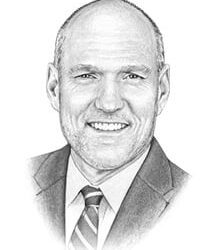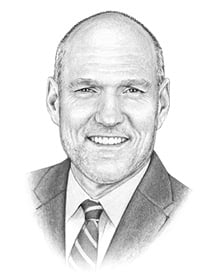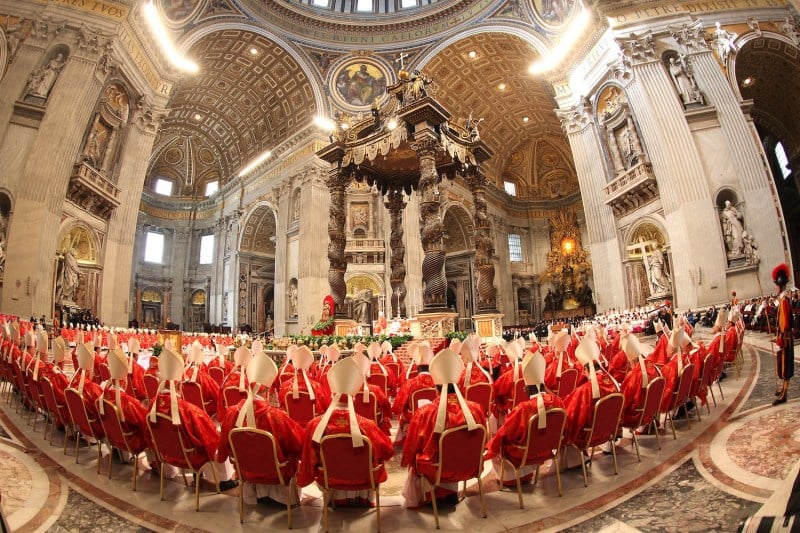Trump and Carney Hold High-Stakes Oval Office Meeting

Trump and Carney Hold High-Stakes Oval Office Meeting
The U.S. president appeared unwilling to back down on tariffs while the Canadian prime minister stood firm on his country’s sovereignty.
Canadian Prime Minister Mark Carney (left) listens as U.S. President Donald Trump speaks to reporters at the White House in Washington on May 6. Anna Moneymaker/Getty Images
Welcome back to World Brief, where we’re looking at U.S.-Canada relations, India launching strikes in Pakistan, and a historic upset in Germany’s Bundestag.
‘Never Say Never’
After winning in last week’s election with a promise to push back against U.S. President Donald Trump’s trade and sovereignty threats, Canadian Prime Minister Mark Carney had his first high-stakes meeting with Trump at the White House on Tuesday.
Welcome back to World Brief, where we’re looking at U.S.-Canada relations, India launching strikes in Pakistan, and a historic upset in Germany’s Bundestag.
‘Never Say Never’
After winning in last week’s election with a promise to push back against U.S. President Donald Trump’s trade and sovereignty threats, Canadian Prime Minister Mark Carney had his first high-stakes meeting with Trump at the White House on Tuesday.
In front of the cameras in the Oval Office, the two men appeared friendly, with no sign of the kind of animus seen during the now-infamous dustup between Ukrainian President Volodymyr Zelensky and the U.S. president in that same room back in February—a dynamic Trump himself pointed out: “We had another little blow up with somebody else,” Trump said, sitting next to Carney. “That was a much different thing. This is a very friendly conversation.”
But although Trump congratulated Carney on his victory and insisted that “regardless of anything, we’re going to be friends with Canada,” neither side appeared willing to make immediate concessions to improve the two countries’ rapidly deteriorating bilateral relations.
At the top of the agenda was the U.S. trade war on Canada. Since taking office, Trump has imposed a slew of tariffs on Canadian goods, including steel and aluminum. When asked by a reporter if there is anything that Carney can say today to change Trump’s mind, Trump remained absolute: “No. That’s the way it is.”
Carney jumped in shortly after, adding, “This is a bigger discussion. There are much bigger forces involved. And this will take some time and some discussions. And that’s why we’re here, to have those discussions.”
Trump also added that he may not be interested in extending the United States-Mexico-Canada free trade agreement, which is set to expire next year. Trump’s team negotiated the deal during his first term in 2018, but he has since questioned whether “it’s even necessary.”
Among the most inflammatory statements of Tuesday’s Oval Office meeting, though, were the two leaders’ comments on Canadian sovereignty. Trump reiterated that he still wants to make Canada the 51st U.S. state. “I believe it would be a massive tax cut for the Canadian citizens,” Trump said. “You get free military, tremendous medical cares, other things. There would be a lot of advantages.” He stressed his history as a real estate developer, referred to the U.S.-Canada border as an “artificially drawn line,” and joked about his past behavior of referring to former Canadian Prime Minister Justin Trudeau as “governor.”
In response, Carney doubled down on his opposition to Canadian statehood. “As you know from real estate, there are some places that are never for sale,” Carney told Trump, adding that Ottawa is “not for sale. It won’t be for sale, ever.”
“Never say never” was Trump’s response.
After the public meeting ended, the two leaders and their respective teams of advisors held a roughly 90-minute private working lunch, where they were expected to begin the process of negotiating the myriad trade and other issues that have now divided the once-close allies.
Today’s Most Read
- What Trump’s New Budget Says About U.S. Foreign Policy by Lili Pike and Rishi Iyengar
- Is It Too Late to Slow China’s AI Development? by Rishi Iyengar and Lili Pike
- How Ancient Rome Blew Up Its Own Business Empire by Bret Devereaux
What We’re Following
India strikes Pakistan. India’s military launched strikes at alleged “terrorist infrastructure” in Pakistan on Tuesday, hitting nine targets across the country and in the disputed Jammu and Kashmir region. “Our actions have been focused, measured and non-escalatory in nature,” the Indian military released in a statement. “No Pakistani military facilities have been targeted.”
Islamabad has already vowed retaliation at the “time and place of its own choosing.”
Code-named “Operation Sindoor,” India’s assault was in response to a militant attack in India-controlled Kashmir last month that killed 25 Indian civilians and one Nepali national. New Delhi has accused Islamabad of supporting militants such as the Kashmir Resistance group, which claimed responsibility for the attack, but Pakistan denies these allegations.
Since last month’s attack, relations between India and Pakistan have soured; however, this degradation has largely been contained to the diplomatic sphere, with both sides revoking visas, suspending trade, and (for India’s part) suspending a crucial water-sharing treaty. But New Delhi’s assault and Islamabad’s looming response mark a major escalation in military tensions between the two nuclear-armed powers that many fear could lead to all-out war.
Second time’s the charm. CDU leader Friedrich Merz formally became Germany’s chancellor on Tuesday, though not without a historic upset. During the Bundestag’s first vote early Tuesday, Merz only secured 310 votes. This fell short of the 316 votes needed to become chancellor, and it highlighted a worrisome lack of confidence within Merz’s own coalition, which holds 328 seats in parliament. Although Merz eventually clinched 325 votes in a second vote, his legacy will forever include the fact that he was the first post-World War II German leader to fail to secure the chancellorship on the first ballot.
Many of Merz’s struggles stem from the far-right Alternative for Germany (AfD) party, which despite being the largest opposition group in parliament has been shut out of coalition talks. Since the end of World War II, Germany’s mainstream parties have maintained a so-called firewall to avoid cooperating with the AfD’s and other far-right parties’ extremist policies. And in January, Merz lost a high-profile vote on tougher immigration restrictions by cooperating with the far-right party.
Since then, Merz appears to have learned to stay clear of the AfD. That, however, has encouraged the far-right group to blast Merz’s proposals, criticizing his government as “unstable” and calling for fresh elections.
Attacks on aid infrastructure. A dayslong drone assault reached new heights in Sudan’s wartime capital on Tuesday, with explosions and fires targeting facilities in Port Sudan used by the Sudanese army. Since Sunday, attacks have struck strategic fuel caches, an electricity substation, Port Sudan International Airport, and other areas that help deliver aid to the city. The Sudanese army has blamed the paramilitary Rapid Support Forces (RSF) for the operation, though the rebel group has not claimed responsibility.
This week’s assault comes amid a disappointing International Court of Justice (ICJ) ruling for Sudan. On Monday, the ICJ said it does not have jurisdiction to investigate the army’s claim that the United Arab Emirates has supplied weapons to the RSF and therefore fueled genocide in Darfur. It also declined to issue provisional emergency measures against the UAE.
Sudan on Tuesday said the ruling does not absolve the Middle East country of genocide allegations, and it vowed to pursue other legal avenues. But the UAE reiterated its innocence and called the case “utterly baseless.”
Far-right pivot. Romanian Prime Minister Marcel Ciolacu resigned on Monday after far-right opposition leader George Simion swept Sunday’s presidential election re-run with more than 40 percent of the vote. Ciolacu’s own candidate, Crin Antonescu, came in third place with just 20.1 percent, less than a percentage point behind second-place candidate Nicusor Dan, the centrist mayor of Bucharest.
“This coalition is no longer legitimate,” Ciolacu said on Monday. “The next president was going to replace me anyway. That’s what I’ve read.” Simion and Dan will face off on May 18 for the final round.
Ciolacu’s leftist Social Democratic Party won the most seats in parliament last December and soon after formed a pro-Western coalition to advocate for NATO-friendly policies. But Simion’s victory on Sunday shows growing public support for an isolated Romania, one that diminishes the country’s support for Ukraine in its war against Russia and becomes more aligned with populist leaders in Hungary, Slovakia, and the United States.
Odds and Ends
A 68-year-old Swiss woman could be fined more than $5,000 for repeatedly feeding her neighbor’s cat, Leo, during a period of 10 months even after the kitty’s rightful owner told her to stop doing so. Prosecutors on Tuesday also accused the woman of adapting her apartment’s cat flap to allow Leo to enter at any time, which resulted in the cat never returning home. Under Swiss law, systematically feeding and sheltering another person’s pet is considered unlawful appropriation.
In more whiskered news, today is Gotcha Day for Pepper, the faithful (and thankfully not exploratory) cat of FP’s World Brief writer.
Alexandra Sharp is the World Brief writer at Foreign Policy. X: @AlexandraSSharp
More from Foreign Policy
-

Eight people dressed in camouflage military combat uniforms wade across a river, the water up to their waists. The soldiers carry large backpacks along with their rifles. Snowcapped mountains and a thick forest of evergreen trees loom in the distance. Get Ready for the Aleutian Island Crisis
As conflict heats up in the Arctic, foreign adversaries eye Alaskan territory.
-

U.S. President Donald Trump speaks to reporters before boarding Air Force One at Morristown Municipal Airport in Morristown, New Jersey, on April 27. Trump’s First 100 Days Reveal a ‘Strongman’s’ Unprecedented Weakness
No U.S. president has ever surrendered global power so quickly.
-

An elderly man and woman sit on the ground, the man on his knees as he sorts through something on the ground. Behind him are a rusted cart and bicycle in front of a paint-smeared concrete wall and a battered corrugated metal sign with the words USAID: From the American people” on it. What Trump’s New Budget Says About U.S. Foreign Policy
The president wants to significantly pull back on many of America’s traditional global engagements while spending more on the border and defense.
-

U.S. President Donald Trump listens to Secretary of State Marco Rubio at a cabinet meeting in the White House in Washington, D.C. Rubio’s Reorganization Plan Is a Wrecking Ball
The State Department revamp goes far beyond streamlining—it will devalue human rights and strip away critical expertise.









Join the Conversation
Commenting on this and other recent articles is just one benefit of a Foreign Policy subscription.
Already a subscriber?
.
Subscribe
Subscribe
View Comments
Join the Conversation
Join the conversation on this and other recent Foreign Policy articles when you subscribe now.
Subscribe
Subscribe
Not your account?
View Comments
Join the Conversation
Please follow our comment guidelines, stay on topic, and be civil, courteous, and respectful of others’ beliefs.
Change your username |
Log out
Change your username:
CANCEL
Confirm your username to get started.
The default username below has been generated using the first name and last initial on your FP subscriber account. Usernames may be updated at any time and must not contain inappropriate or offensive language.